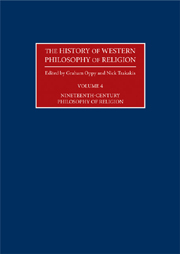Book contents
- Frontmatter
- Contents
- Editorial Introduction
- Contributors
- 1 Nineteenth-Century Philosophy of Religion: An Introduction
- 2 Johann Gottlieb Fichte
- 3 Friedrich Schleiermacher
- 4 G. W. F. Hegel
- 5 Friedrich Schelling
- 6 Arthur Schopenhauer
- 7 Auguste Comte
- 8 John Henry Newman
- 9 Ralph Waldo Emerson
- 10 Ludwig Feuerbach
- 11 John Stuart Mill
- 12 Charles Darwin
- 13 Søren Kierkegaard
- 14 Karl Marx and Friedrich Engels
- 15 Wilhelm Dilthey
- 16 Edward Caird
- 17 Charles S. Peirce
- 18 Friedrich Nietzsche
- 19 Josiah Royce
- 20 Sigmund Freud
- 21 Émile Durkheim
- Chronology
- Bibliography
- Index
1 - Nineteenth-Century Philosophy of Religion: An Introduction
- Frontmatter
- Contents
- Editorial Introduction
- Contributors
- 1 Nineteenth-Century Philosophy of Religion: An Introduction
- 2 Johann Gottlieb Fichte
- 3 Friedrich Schleiermacher
- 4 G. W. F. Hegel
- 5 Friedrich Schelling
- 6 Arthur Schopenhauer
- 7 Auguste Comte
- 8 John Henry Newman
- 9 Ralph Waldo Emerson
- 10 Ludwig Feuerbach
- 11 John Stuart Mill
- 12 Charles Darwin
- 13 Søren Kierkegaard
- 14 Karl Marx and Friedrich Engels
- 15 Wilhelm Dilthey
- 16 Edward Caird
- 17 Charles S. Peirce
- 18 Friedrich Nietzsche
- 19 Josiah Royce
- 20 Sigmund Freud
- 21 Émile Durkheim
- Chronology
- Bibliography
- Index
Summary
The predominant position of nineteenth-century philosophy of religion was conciliatory. Its main figures set out to confront, absorb and pass beyond the radical Enlightenment's critical assault on Europe's religious and metaphysical tradition by developing philosophical syntheses that, to a great extent, assimilated the main lines and presuppositions of these critiques, while simultaneously preserving the most important features of Europe's religious inheritance. This spirit of conciliation is as evident in the metaphysical systems of mainstream German idealism at the opening of the century, as it is in the neo-Kantian inspired division between fact and value that dominated philosophy of religion at its close. In the long term, however, this synthesis turned out to be as fragile as it was subtle; although it managed to weather the stormy changes and extremes that buffeted it for the greater part of the century, its elements were eventually torn apart by the extreme intellectual and cultural conditions that emerged with the killing fields of the First World War.
THE RADICAL ENLIGHTENMENT: SPINOZA AND HUME
The Enlightenment inaugurated a fundamental upheaval in the European tradition of philosophical reflection on religion, for it was during this period that philosophers developed perspectives on the theological inheritance of the West, and methods of analysing its main themes, that dispensed with the assumptions and sources of the great works of late medieval scholasticism, such as the Disputationes Metaphysicae (Metaphysical disputations) of Francisco Suàrez (1548–1617) (see Vol. 3, Ch. 6).
- Type
- Chapter
- Information
- The History of Western Philosophy of Religion , pp. 1 - 20Publisher: Acumen PublishingPrint publication year: 2009

